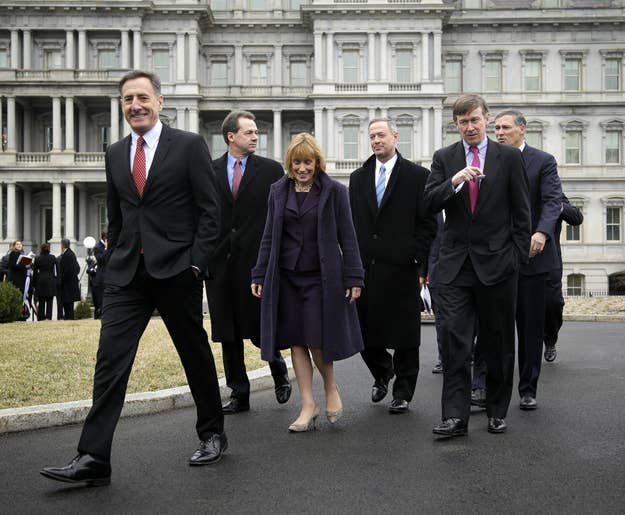
While most D.C. lawmakers show scant interest in pushing through new legislation on climate change, Democratic governors across the country are advancing a new argument on the way forward: reducing carbon emissions and investing in clean energy, they say, is a job for the states.
"I personally believe that with this obstructionist Congress," said Vermont Gov. Peter Shumlin, "nothing much good is gonna happen in Washington despite the president's best efforts."
Climate change does have its champions in Washington — the president gave it top billing in his State of the Union address last month — but amidst already ongoing battles over gun control and immigration, and the looming threat of the 2014 midterm election, action from Congress in the next two years remains unlikely.
The states, Shumlin told BuzzFeed, have the opportunity and responsibility to take the lead until legislation at the federal level becomes more feasible.
Since Shumlin became governor two years ago, Vermont has doubled its solar energy, and the state became one of nine in the northeast and mid-Atlantic to partner in the Regional Greenhouse Gas Initiative, a promise to cap power plant emissions at 91 million tons of carbon per year in 2014.
"The states do need to be the laboratories for energy policy, and Vermont is certainly a good example," Shumlin said.
The new governor of Washington, Jay Inslee, chose to dedicate a large section of his inaugural address two months ago to climate change, arguing that there was "no challenge greater" for his administration.
"One of the reasons I ran for governor," Inslee told BuzzFeed, "is I believe my state can help lead the nation and the world to a high-technology future that will be beneficial economically, and for our environment."
"The states are the place where we are going to make progress in the next year or two," he added. "This is the field the game is going to be played on, and we're going to move the ball."
In a state like Hawaii — with low-lying coastal islands already exposed to rising sea levels as a result of global warming — taking measures to curb global warming is a necessity, not a political choice, said Gov. Neil Abercrombie.
"I can't say what the Congress will do or not do, but we have to come to grips with these things," said Abercrombie. "We have to take this on. Climate change as a concept is one thing, but trying to deal with it on a state-by-state basis, particularly if you're in the middle of the Pacific as we are, involves finding local solutions."
Shumlin, also chair of the Democratic Governors Association, argued that investing in clean energy at the state level would "not only reduce our carbon footprint — it's gonna grow jobs," he said.
"Because we're harnessing the wind and the sun and our streams and bio mass, the result is, we have more green clean jobs per capita than any other state in America," Shumlin said. "So it's working."
Although Republicans in and outside Washington have maintained that acting on climate change this year would do damage to an economy still in recovery, Delaware Gov. Jack Markell said the creation of added clean energy jobs should be incentive enough for red states.
"State by state, different governors can make the determination of how much they want to do," said Markell, a Democrat. "The good thing, though, is that we're showing you can improve your economy while also taking care of your environment at the same time — that's a win-win, and it's something more governors of both parties will look to do."
But even in the face of Hurricane Sandy — the storm that pummeled up the East Coast last October, causing an estimated $50 billion in damage across the country — Republican governors are reluctant to credit climate change as an immediate challenge to their states.
New Jersey Gov. Chris Christie, whose state was hit the hardest by Sandy, said last month that the environmental causes of the storm are beside the point.
"Maybe in the subsequent months and years, after I get done with rebuilding the state and getting people back in their homes," he said during a press conference, "I'll have the opportunity to ponder the esoteric question of the causes of the storm."
But Shumlin remembers the storm in 2011, Hurricane Irene, that in Vermont alone claimed seven lives and $733 million in damage, as a pressing call to action for his state. Climate change on a federal level, he said, is political, but in the states, it easily takes on a strong shade of the personal.
"I'm convinced that when I go and fight a storm like Irene," said Shumlin, "and I lose seven great Vermonters who die in a storm, and I see hundreds of Vermonters lose their homes, their businesses, every belonging they ever had, every photograph of their kids they ever had, and I'm out there giving them hugs and wishing I could restore their lives — but I know I can't — that's when climate change is staring me in the face."
